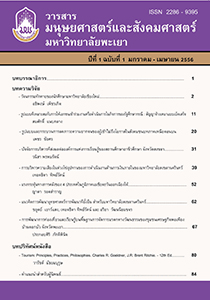แรงกระตุ้นทางการคลังของ 4 ประเทศในภูมิภาคเอเชียตะวันออกเฉียงใต้
Keywords:
แรงกระตุ้นทางการคลัง, นโยบายการคลัง, รายจ่ายรัฐบาล, รายได้รัฐบาล, Fiscal impulse, Fiscal policy, Government expenditure, Government revenueAbstract
การศึกษานี้มีวัตถุประสงค์เพื่อศึกษาผลกระทบของนโยบายรายได้และรายจ่ายโดยใช้วิธีการวัดแรงกระตุ้นทางการคลัง โดยทำการศึกษาประเทศในภูมิภาคเอเชียตะวันออกเฉียงใต้ ได้แก่ ไทย มาเลเซีย อินโดนีเซีย และสิงคโปร์ ตั้งแต่ปี 1987-2009 ซึ่งใช้แบบจำลองที่ดัดแปลงมาจาก The German Council of Economic Expert : GCEE ของ กองทุนการเงินระหว่างประเทศ (IMF) ผลการศึกษาพบว่า ทั้ง 4 ประเทศ เน้นการดำเนินนโยบายแบบต่อต้านวัฎจักรเศรษฐกิจ แต่ในบางกรณี รัฐบาลมีข้อจำกัดในการดำเนินนโยบายการคลัง เนื่องจากรายจ่ายประจำมีสัดส่วนที่สูง ในขณะที่สัดส่วนรายจ่ายด้านสวัสดิการสังคมค่อนข้างต่ำ ประกอบกับมีความล่าช้าในกระบวนการอนุมัติโครงการ และความเสี่ยงจากการรั่วไหล โครงสร้างทางการคลังจึงมีลักษณะผันผวนตามวัฏจักรเศรษฐกิจ
Fiscal Impulse in Four Asian Countries
Yada Rodsumran
Faculty of Economics, Chulalongkorn University, Pathumwan
The study of fiscal impulse in four Asian countries aimed to analyze the government expenditure and revenue policy and to determine the impact of government expenditure and revenue policy by using fiscal impulse indicator in Four Asian Countries namely Thailand, Malaysia, Indonesia and Singapore. Data used were secondary data from 1987 to 2009. This study employed The Fiscal Impulse Model as developed by The Council of Economic Expert (GCEE) to determine the impact of policy. The results showed that the different stance and goal of policy depends on social characteristics, administration, political regime and economic situation. The study of fiscal impulse showed that the behavior of fiscal policy in four Asian countries is countercyclicality. However, in some cases, fiscal policy constraints in four Asian countries included high current expenditure to GDP ratio, low social welfare expenditure to GDP ratio, delay in project approval process and withdrawal risk. Therefore, in some case, fiscal policy in four Asian countries was procyclicality.
Downloads
How to Cite
Issue
Section
License
ผู้นิพนธ์ต้องรับผิดชอบข้อความในบทนิพนธ์ของตน มหาวิทยาลัยพะเยาไม่จำเป็นต้องเห็นด้วยกับบทความที่ตีพิมพ์เสมอไป ผู้สนใจสามารถคัดลอก และนำไปใช้ได้ แต่จะต้องขออนุมัติเจ้าของ และได้รับการอนุมัติเป็นลายลักษณ์อักษรก่อน พร้อมกับมีการอ้างอิงและกล่าวคำขอบคุณให้ถูกต้องด้วย
The authors are themselves responsible for their contents. Signed articles may not always reflect the opinion of University of Phayao. The articles can be reproduced and reprinted, provided that permission is given by the authors and acknowledgement must be given.








